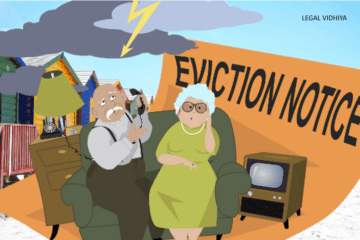
Abstract
This article is written by of Ashwitha.T of 4th Semester of ICFAI Law School Hyderabad
With human development, the idea of possession has increasingly expanded. As civilization spread, people began to recognise the value of owning particular items, and in this way, the concept of ownership was first established. Due to the difficulty of the battle for survival, people started to acquire particular possessions and to take pleasure in them by defending them against intruders. To the exclusion of everyone else, they maintained constant control. The idea of possession slowly evolved from its modest beginnings, and significant advancement has been achieved in this area.
Keywords: “Specific relief act 1963”, Indian Penal code, Section 456 of CrPc
Introduction
“The Specific Relief Act of 1963” has taken into account a wide range of legal aspects related to remediation. A social redress must be available to every person who has been mistreated in the course of society, according to the “Ubi jus ibi remedium principle”. Even if this act of 1963 solely focuses on the enforcement of civil rights and not criminal law, civil laws must also take into account an individual’s rights since doing so may result in extremely violent disputes. This is how the “Code of Civil Procedure of 1908” recovers possession of either moveable or immovable property. The word “possession” refers to more than only real usage or meagre occupation. One of the revered characteristics of common law equity is the remedy offered by the “Specific Relief Act of 1963”, which allows the recovery of custody of the specific property in lieu of any monetary damages or compensation. Even Indian Penal Code has the provisions for illegal occupation of property and remedies. Code of Criminal Procedure framed the laws to recover the dispossessed property.
What are the ways in which illegal possession is carried out?
- when a group of uninvited individuals fabricates paperwork and forcibly occupies a property. Some people often engage in this illegal practise because they do it for a living. Unfortunately, occasionally certain local officials help these individuals engage in such illegal activities.
- When a renter refuses to leave your property, it may also result in such an illegal possession. Tenants typically use adverse possession as a defence. It is suggested to create a good lease before leasing out your property and to take serious precautions to stay out of situations like these. These circumstances typically occur when unattended homes that are unlawfully inhabited, renters who are not identified, or buildings that have lain empty for a long time become easy targets for such infamous individuals.
- Adverse possession occurs when the legitimate owner of the land forfeits his ownership rights as a result of his failure to evict a trespasser or occupier from the property within the required amount of time (12 years, according to Indian law). The lawful owner is prohibited from starting any legal action to regain possession of his property after the statutory limitation period for doing so has passed, allowing the trespasser to obtain the title to that property by adverse possession[1]
WHAT IS POSSESSION?
- Whether you own something or not, possession refers to have actual control over it. However, though a person is not the owner, the person in possession of the object has certain legal protection from third parties. Any illegal act of violence committed contrary to the person in possession is protected by this guarantee.
- The owner, in this example NRIs, hasn’t looked into these properties in years, thus those in possession have rights based on the fact that they continue to enjoy them. Additionally, as was also previously indicated, trespassers may falsify paperwork, making it harder to get them to be removed.[2]
LAW RELATING TO RECOVERY OF POSSESSION OF PROPERTY UNDER SPECIFIC RELIEF ACT,1963
- India’s parliament established the “Special Relief Act in 1963”, replacing the Common Doctrine that had been in place before to the country’s independence. The Law Commission’s ninth report on the legislation made the initial recommendation for it. “The Specific Relief Act of 1877” was repealed in 1962 by a law that was approved by both houses. “The Special Relief Act, 1963” can be invoked for special performance of the contract, providing justice and adequate relief. The contractual obligations and compensation were initially only available for the breach of the contract, by which the situation requires more stringent and much more than the compensation.
- Under this legislation, the court issues an order requiring the contract’s exceptional performance in accordance with the original terms and conditions signed between the parties. rather than just a simple payment of compensation[3].
SPECIFIC RELIEF ACT ,1963
- According to Section 5 of the Specific Relief Act, a person who is entitled to possession of a specific piece of real estate may initiate a lawsuit for recovery in accordance with the 1908 Code of Civil Procedure.
- The Specific Relief Act of 1963’s Section 6 gives a person who loses ownership of immovable property without his agreement a remedy in accordance with the law. He may also file a lawsuit to reclaim the possession, disregarding any other titles that may be asserted in the lawsuit. Therefore, it is not permissible for someone to take a forcible possession. They must acquire the things to which the court has granted them a right.
- The rights of a lawful owner are guaranteed by Section 4 of this legislation. Nothing in this section shall prevent someone from bringing a claim to regain possession of such property that belongs to them in order to prove title to such property. The restoration of these types of properties in such a matter is always subject to a normal title suit, and the party in possession of the genuine title cannot be adversely affected by a ruling in such a suit.[4]
Recovery Of Possession Of Immovable Property
Any person who is entitled to the legitimate ownership of immovable property may regain such possession via due process of law by engaging in one of three types of proceedings, according to Sections 5 and 6 of the Specific Relief Act, 1963:
- a claim made against the title based on ownership
- Based on the possessory title, take some action
- An action founded on prior occupancy brought by the plaintiff when he has been ejected from his home against his will
- The purpose of section 6 is to prevent someone from removing the plaintiff’s property outside of the legal process by using force or against his will notwithstanding the plaintiff’s long-term, uninterrupted possession of it.
- This was shown in the Puthukkattil Parangodan v. Puthukkattil Parameswaram case, when the tenancy’s key elements were completely dissolved and the tenancy ended on its own. Even yet, the landlord could only obtain the property by going through the legal system.[5]
Recovery Of Possession Of Movable Property
The Code of Civil Procedure, 1908’s remedies for regaining control of specified moveable property are established under Sections 7 and 8 of the specified Relief Act of 1963. In accordance with the terms of Section 8, a person who is now in possession of property but is not the owner is entitled to immediate possession and is responsible for returning the property to that person.
CASE LAWS
Ravindra Kaur Grewal v. Manjit Kaur[6]
- The court held that the article 65 of the limitation act, 1963 not only allows people to file suits of adverse possession as a defendant’s shield but also that the plaintiff can use it as a weapon to protect the possession of his immovable property and can also recover his possessions in case of dispossession. The court’s three-judge panel included Arun Mishra, SA Naseer, and MR Shah, JJ. The court ruled that the other person cannot surpass the other person in possession without following the correct legal procedures. The right of the owners to evict him disappears after the 12-year term of adverse possession. The exiting person or owner, depending on the situation, against whom he has prescribed the property, must hold the right, title, and interest required by the possession order.
- Even though it is a negative conferral of rights on the extinction of a property owner’s right, the plaintiff may have acquired the title. If the right is absolute and he is in possession, he may file a lawsuit using the title that was foreseen in the article 65 of the act’s opening paragraph.
- As a result, the court determined that the plaintiff might claim adverse possession by claiming that the title was acquired. Article 65 of the Limitation Act states that there is no impediment to filing a lawsuit based on the aforementioned grounds where a plaintiff’s rights have been violated[7].
WHAT ARE THE PROVISIONS UNDER THE INDIAN PENAL CODE(IPC) RELATING TO THE ILLEGAL OCCUPATION OF PROPERTY?
Section 436 – “Mischief”
According to Section 436, anyone who intentionally or knowingly commits mischief by using fire or an explosive substance to destroy a building that is typically used as a place of worship, a residence for people, or a location to store property is subject to a sentence of either life in prison or a maximum of ten years in prison. They could also receive a fine. According to Section 425, “mischief” is defined as the willful destruction or damage of property that is not one’s own. If someone knows that their acts are likely to hurt or damage someone or the public, they can also be charged with mischief. Any harm to the property that lowers its worth, renders it less usable, or otherwise has a negative impact qualifies as damage. It doesn’t matter if the individual who committed the crime didn’t mean to cause the property owner any harm. On either the perpetrator’s own or other people’s property, mischief might be made[8].
Section 441 – “Criminal Trespass”
According to Section 441, “criminal trespass” occurs when someone enters another person’s property without permission with the intent to do one of the following: commit a crime; intimidate, insult, or annoy the property owner; or if they enter legally but remain there illegally after doing so in order to do one of the foregoing. Criminal trespass offences are punishable by up to three months in jail, a fine of up to 500 rupees, or both, according to Section 447 of the Indian Penal Code[9].
Section 442 – House Trespass
According to Section 442, “house trespass” is defined as the unlawful entry into a structure, tent, or vessel used as a place of habitation, a place of worship, or a storage facility for goods without the owner’s consent. It still counts as “house trespass” if a person enters the building unlawfully even in part. According to Section 448, those who violate the law by entering someone else’s home may be sentenced to up to a year in jail, a fine of up to 1,000, or both.[10]
Section 443 – Lurking House Trespass
According to Section 443, if someone enters a building, tent, or vessel without authorization and makes an effort to hide their entry from someone who has the authority to exclude or remove them, they are guilty of “lurking house trespass.” Lingering house trespass is punishable by up to two years in jail and a fine under Section 453[11].
JUDGMENT BY SUPREME COURT IN ILLEGAL POSSESSION OF LAND
Nair Service Society Limited v. KC Alexander[12]
- In this instance, the Judicial Committee of the Privy Council’s judicial summary of the law of adverse possession from Perry v. Clissold was upheld. In such instance, it was discovered that a lawful owner’s ownership right expires if he fails to assert it against a possessor within a certain amount of time. The Limitation Act of 1963 establishes a 12-year statute of limitations for actions seeking possession of real estate or any interest based on the title. But because of Section 25 of the Act, the statute of limitations for the government is 30 years[13].
Bhimrao Dnyanoba Patil v. State of Maharashtra[14]
- In this instance, it was decided that mere possession for a long time, even throughout a statutory term, would not be sufficient to mature the title to the property by adverse possession unless enjoyment of the property was coupled by unfavourable animus[15].
SECTION -456 OF CRPC[16]
- If it appears to the court that a person has been deprived of any immovable property by criminal force, show of force, or intimidation after being convicted of an offence involving any of those, the courts may, if it thinks fit, order the ownership of that property be brought back to that person after eliminating by force, if required, any other person who may be in ownership of the property; Provided, however, that no such order shall be made.
- The Court of Appeal, Confirmation, or Revision may, if it sees appropriate, make such an order while adjudicating the appeal, reference, or revision, as the case may be, in cases where the Court trying the offence has not made an order under Sub-Section.
Conclusion
The Indian Contract Act of 1872 only provides compensation in cases of contract breach, making the remedy of Recovery of Possession of Property under Specific Relief Act, 1963, necessary. This act recompenses the possessory title of the rightful possessor through the appropriate intervention by the court. So, in cases when damage is difficult to quantify and compensation is insufficient to provide relief, such a remedy becomes essential.
[1]Steps to get back your property from illegal possession, available at: https://lawrato.com/indian-kanoon/property-law/steps-to-get-back-your-property-from-illegal-possession-1786(last visited on June 16,2023)
[2] steps to get back your property from illegal possession, available at: https://lawrato.com/indian-kanoon/property-law/steps-to-get-back-your-property-from-illegal-possession-1786(last visited on June 16,2023)
[3]Law Relating to Recovery Of Possession Of Property Under Specific Relief Act ,1963 available at:
https://www.legalserviceindia.com/legal/article-5598-law-relating-to-recovery-of-possession-of-property-under-specific-relief-act-1963.html(last visited on June 17 ,2023)
[4]Law Relating to Recovery Of Possession Of Property Under Specific Relief Act ,1963 available at:
https://www.legalserviceindia.com/legal/article-5598-law-relating-to-recovery-of-possession-of-property-under-specific-relief-act-1963.html(last visited on June 17 ,2023)
[5]Recovery of Possession of Immovable Property, available at: https://www.legalserviceindia.com/legal/article-6091-recovery-of-possession-of-immovable-property.html(last visited on June 17,2023)
[6] Ravinder Kaur Grewal v. Manjit Kaur (2019) 8 SCC 729
[7] Law Relating to Recovery Of Possession Of Property Under Specific Relief Act ,1963 available at:
https://www.legalserviceindia.com/legal/article-5598-law-relating-to-recovery-of-possession-of-property-under-specific-relief-act-1963.html(last visited on June 17 ,2023)
[8] steps to get back your property from illegal possession, available at: https://lawrato.com/indian-kanoon/property-law/steps-to-get-back-your-property-from-illegal-possession-1786(last visited on June 16,2023)
[9] Ibid
[10]Ibid
[11] Ibid
[12] Nair Service Society Limited v. KC Alexander 1968 AIR 1165
[13] steps to get back your property from illegal possession, available at: https://lawrato.com/indian-kanoon/property-law/steps-to-get-back-your-property-from-illegal-possession-1786(last visited on June 16,2023)
[14] Bhimrao Dnyanoba Patil v. State of Maharashtra 1968 AIR 1165
[15] Ibid
[16] The Code Of Criminal Procedure ,1973




0 Comments